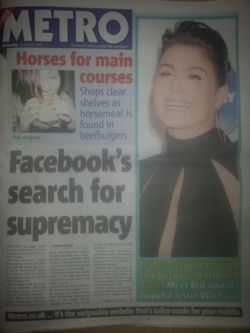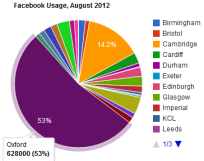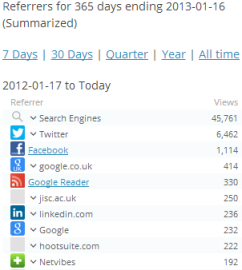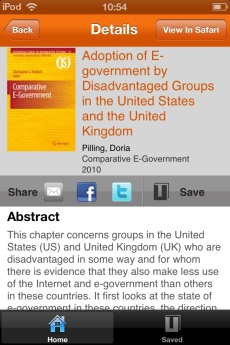A Week of Facebook Developments
Last week saw a number of interesting Facebook developments which may have implications for the higher and further education sector. A new Facebook feature, Facebook Questions, was rolled out to all users on March 24 and the following day an Operation Developer Love: Facebook Hack Day took place in Berlin which generated some interesting discussions on Twitter. Whilst I am aware that many developers and others who have interests in the use of networked technologies to support educational and research activities have concerns regarding various aspects of the Facebook environment I feel that there is a need to monitor significant developments and to have an open discussion about the potential of such developments as well as possible concerns.
Facebook Questions
A post was published on Mashable on 27 March 2011 which outlines reasons why “Why Facebook’s New Questions Tool Is Good for Brands & Businesses“. The post began:
Brands and businesses are looking for ways to leverage Facebook’s recently unveiled Questions tool in ways that differ from what they’re already doing on Q&A sites such as Quora, Yahoo Answers and LocalMind.
This new feature, which functions as a recommendation engine, was rolled out to all users on March 24. According to Ben Grossman, communication strategist for marketing agency Oxford Communications “It also presents a major opportunity for businesses to conduct market research and crowdsource in a far more elegant way than was previously possible“.
Looking at my Facebook contacts I’ve found that an early user of the new feature was Euan Semple who responded to the question “Check out the new Facebook Questions what do you think? :)“. The answer, it seems, is that 8 people aren’t sure, 4 love it, 16 feel it could be a useful tool whilst one person doesn’t like it at all.
 Whilst many of my other Facebook contacts have been answering fairly trivial questions (such as “FOOTBALL OR RUGBY ? WHICH IS BETTER ? ” and “WHO WOULD WIN IN A FIGHT“) Aaron Tay, a librarian at the National University of Singapore (who was also recently named as a Library Journal Mover & Shaker 2011), has started to explore how the service can be used to support his professional interests, asking, for example, What is your favourite database/ search engine (excluding Google & Wikipedia)?
Whilst many of my other Facebook contacts have been answering fairly trivial questions (such as “FOOTBALL OR RUGBY ? WHICH IS BETTER ? ” and “WHO WOULD WIN IN A FIGHT“) Aaron Tay, a librarian at the National University of Singapore (who was also recently named as a Library Journal Mover & Shaker 2011), has started to explore how the service can be used to support his professional interests, asking, for example, What is your favourite database/ search engine (excluding Google & Wikipedia)?
I have not yet come across any universities making use of Facebook Questions to gather feedback but as described in the Mashable blog post the feature can be used by organisations and groups and not just individuals. Once a Facebook page owner has set up the appropriate configuration options:
Brands, businesses, groups and organizations can then use Questions in several ways. For example, Grossman said:Ice cream parlors can find out what the flavor of the week should be.
- A gym can find out what time is best for its new hip-hop yoga class.
- Radio stations can determine the hottest concerts for the summer.
- Manufacturers can do a pulse check on fans’ holiday shopping plans.
In light of the increased importance of marketing an institution to new and existing customers (and since many new students will be paying £9,000 per year to attend University we should be regarding them – or their parents – as customers) I suspect we will start to see greater use of Facebook Questions. Is any University already using it, I wonder?
The Operation Developer Love: Facebook Hack Day
The #fbdevlov Twitter Discussion
On its own Facebook Questions is simply a new feature which has been deployed by a large scale social networking environment. Of greater interest to the develop[er community was the Operation Developer Love: Facebook Hack Day (see also the Facebook page) which took place in Berlin on Friday 25 March.
I became aware of this event through spotting tweets from three people in my Twitter stream: @gkob, @kidehen and @ldodds. I follow these three individuals as I am aware of their active involvement in Linked Data developments, which is illustrated in the following biographical details provided on Twitter or, in @ldodds case, his personal Web site:
@gkob (Georgi Kobilarov):
CEO at Uberblic Labs. data geek. building data infrastructure for the Web. trying to change the world. linked & open data advocate. ex dbpedia developer.
@kidehen (Kingsley Uyi Idehen)
Founder & CEO, OpenLink Software, An Open Linked Data Enthusiast.
@ldodds (Leigh Dodds)
Until recently Leigh Dodds was the CTO of Ingenta where he was responsible for the ongoing development of their publishing platform based on Semantic Web technologies. Leigh has recently joined Talis as Programme Manager for the Talis Platform
Since I am aware of their involvement in Linked Data development activities I was fascinated by the Twitter discussion which took place around the tweets for the Facebook Developer Love Hack Day. The Twitter hashtag for the event was #fbdevlove. I created a Twapper Keeper archive for the hashtag and also used Storify to keep an archive of the discussions around structured data available through Facebook and Linked Data developments. In brief Georgi Kobilarov (@gkob) initiated the discussion with a message to other Linked Data developers::
#linkeddata folks: forget all your RDF & Sparql, you’ll have to compete with Facebook’s Graph API, and that war is about developer love
Kingsley Idehen (@kidehen) responded:
@gkob Facebook (#FB) is just another Data Space plugged into the global #WWW Data Space. It’s all good re. #LinkedData. “AND” is good :-)
@gkob #Facebook has been creating a massive#LinkedData hub since inception. It doesn’t have to be hardcore #RDF to be useful Linked Data.
@gkob key thing is this: #Facebook is a massive#LinkedData Space plugged into the global #WWWdata space. User Agents can query it.
@gkob I don’t have any problems querying#Facebook or meshing its data with data from other places en route to richer #LinkedData. All good.
@gkob #RDF != #LinkedData. What #Facebook#Microsoft #Google #Yahoo! etc.. r doing re. structured data (without #RDF) is quite valuable.
An interesting perspective, I thought. To put it another way, the global Social Web providers, such as Facebook, are well positioned to significantly enhance deployment of Linked Data by providing access to the large-scale structured information repositories they host.
 Facebook’s Open Graph API
Facebook’s Open Graph API
An example of a tool which developers can use to explore Facebook’s Open Graph API was mentioned by @sicross: his Facebook Graph API Explorer. I have used this tool to retrieve data for two institutional Facebook pages: the University of Bath and the University of Cambridge. You can view the output for the Universities of Bath and Cambridge.
I have previously surveyed institutional Facebook pages for Russell Group Universities in order to identify emerging patterns of usage. This survey provide a manual comparison which would be resource intensive to carry out across all UK Universities (and even more so if international comparisons were to be made). However use of the Facebook Graph API Explorer has helped to identify patterns of usage which could be carried out in an automated way including the following numerical data:
University of Bath:
Nos. of likes: 3,357
Nos. of checkins: 1,081
University of Cambridge:
Nos. of likes: 69,824
We can immediately see that people have been using the Facebook Places feature has been used a significant number of times at the University of Bath but not at all at the University of Cambridge. I must admit that I initially found this surprising: I would have expected an institutional geo-location service to have taken off in an institution which has many buildings scattered throughout the city as opposed to a primarily campus-based institution. However, on reflection, it seems the opposite is true: checking in will have little value for an institution which has based in a large number of locations. Of course it may be that geo-location services provide little value in the context of institutional use. Alternatively it may be that Facebook Places has failed to have an impact in this market – a suggestion which seems to be confirmed by an article published yesterday in the Daily Telegraph which informs us that “Foursquare has doubled its users since Facebook Places launched says chief“.
The potential to gather statistics on the number of Facebook ‘likes’ in an automated way will, I feel, help to provide evidence which can be used to inform policy decisions on institutional use of Facebook and the resources which should be assigned to such work. There could, of course, be dangers that such statistics would be used to publish league tables – but since the aims of higher educational institutions aren’t about maximising numbers of users on Social Web services, such concerns shouldn’t be taken too seriously. However the data gathered could be used in order to help identify the effectiveness of online marketing activities. And if an aim is to ensure that UK Universities are best positioned to market their services to overseas students the UK economy as a whole would benefit from a shared understanding of the benefits and the best practices.
“Is Facebook Killing Off The Company Website?”
A white paper entitled “The Effect of Social Networks and the Mobile Web on Website Traffic and the Inevitable Rise of Facebook Commerce” (PDF format) was published by Web Trends on 17 March 2011. In response Jeff Bullas published a blog post in which he asked “Is Facebook Killing Off The Company Website?“. This discussion centred around evidence of traffic to Fortune 100 company Web sites. The study revealed that “68% of the top 100 companies were experiencing a negative growth in unique visits over the past year, with an average drop of 23%“. In order to identify whether Facebook was responsible for the significant decrease in numbers (as opposed, for example, to the effect of the recession) the numbers of visits to a number of company web site were compared with unique visits to equivalent Facebook pages In a sample of 44 companies it was found that “40% exhibited higher traffic to their Facebook page compared to their website“.
It might be argued that University Web sites are very different from those provided by commercial companies – Universities are concerned with the complexities of teaching and learning and research whereas companies such as Coca Cola and Ford are simply produce drinks or motor vehicles. Such views were made on the Twitter channel during Ranjit Sidu’s talk at the IWMW 2010 event entitled “‘So what do you do exactly?’ In challenging times justifying the roles of the web teams” in which he suggested that the higher education sector could learn from the way companies which sell cars identify the effectiveness of their online activities). It was interesting to note that several participants echoed such sentiments. So let’s be honest and admit that commercial companies and higher educational institutions are not dissimilar in having many diverse objectives and sometimes little understood complexities – and that both sectors may be in a position to exploit social Web services such as Facebook for a variety of purposes (marketing, sales consumer engagements, etc.) but may also feel threatened by such services.
A Challenge For Developers
It was interesting to observe the tweets from the Facebook Developer’s Love hack day and not only to see the enthusiasm for making use of Facebook APIs but also hearing about how Facebook content could be made available as Linked Data on the Web. There are still unresolved issues such as privacy and ownership of data associated with Facebook – but as we have seen similar issues are also faced by Twitter, with still some uncertainties regarding the copyright and ethical issues associated with use of tweets published by others and the ways in which Twitter can enforce their conditions of use of their service. But just as Twitter subsequently toned down the conditions governing reuse of their data, we are also seeing Facebook moving away from their ‘walled garden’ approach and providing APIs to allow others to reuse their content.
As can be seen from the recent post on Use of Facebook by Russell Group Universities Facebook clearly has a role to play across higher educational institutions. Managers and policy-makers within institutions will need to make decisions on how such services should be used and how much effort should be allocated to support such work. Such decisions should be informed by evidence such as “How extensively is Facebook being being used across the sector?” and “What patterns of usage are emerging?“.
Since APIs are available such answers need no longer have to be based on manual surveys. A challenge I would like to pose developers is to provide answers to the following questions:
It should be possible to provide answers to these questions be simply using the Facebook API to query the Facebook data store. However Linked Data developers may relish the challenge to combine this data store with DBPedia in order to answer the following additional question:
- Is there a correlation between the numbers of Facebook ‘Likes’ and the size of the institution – or to put it another way, which institution has the largest number of ‘Likes’ per student?
In the longer term it will be useful to monitor trends in institutional use of Facebook – which may, of course, include a decline in such usage if alternative offerings, such as Diaspora service (which will not claim any rights on content uploaded to the service). But in order to be able to help identify a decline in Facebook usage it will be helpful to have a benchmark of current usage – so even developers who do not approve of Facebook terms and conditions may wish to participate in this challenge.
 The 9th Metadata and Semantics Research Conference has recently announced its call for papers, which is also available as a PDF document.
The 9th Metadata and Semantics Research Conference has recently announced its call for papers, which is also available as a PDF document. In a post on his OUseful blog over a year ago Tony Hirst described the “What did you notice for the first time today?” exercise which he used in a workshop on Future Technologies and Their Applications which Tony and I co-facilitated at the ILI 2013 conference.
In a post on his OUseful blog over a year ago Tony Hirst described the “What did you notice for the first time today?” exercise which he used in a workshop on Future Technologies and Their Applications which Tony and I co-facilitated at the ILI 2013 conference. The use of Facebook to promote research conferences seems to no longer be one of “should we?” but instead one based on a cost-benefit analysis – can the effort in updating a Facebook page for a conference be justified? Fortunately the Facebook statistics for the page provides usage data for helping to answer this question (it should also be noted, incidentally, that the conference’s MTSR 2015 Twitter account currently only has 9 followers).
The use of Facebook to promote research conferences seems to no longer be one of “should we?” but instead one based on a cost-benefit analysis – can the effort in updating a Facebook page for a conference be justified? Fortunately the Facebook statistics for the page provides usage data for helping to answer this question (it should also be noted, incidentally, that the conference’s MTSR 2015 Twitter account currently only has 9 followers).







































 Unlike Twitter and FriendFeed, however, there may be risks that one is spamming one’s contacts with inappropriate status updates. I don’t think this is a significant risk – after all many of my Facebook contacts have status updates based on whatever is the currently popular app. At one stage this was throwing sheep but now I see status updates along the lines of “Kirsty just earned the ‘Zoologist’ White Ribbon in FarmVille!“.
Unlike Twitter and FriendFeed, however, there may be risks that one is spamming one’s contacts with inappropriate status updates. I don’t think this is a significant risk – after all many of my Facebook contacts have status updates based on whatever is the currently popular app. At one stage this was throwing sheep but now I see status updates along the lines of “Kirsty just earned the ‘Zoologist’ White Ribbon in FarmVille!“. At the
At the 

 If you accept this proposition how should you respond to what appears to be the continuing popularity of Facebook? A quick snapshot of my friend’s status indicates that my Facebook friends are regularly updating their status, using a variety of mechanisms, with Twitter users automatically updating their Facebook status via Twitter.
If you accept this proposition how should you respond to what appears to be the continuing popularity of Facebook? A quick snapshot of my friend’s status indicates that my Facebook friends are regularly updating their status, using a variety of mechanisms, with Twitter users automatically updating their Facebook status via Twitter.
You must be logged in to post a comment.